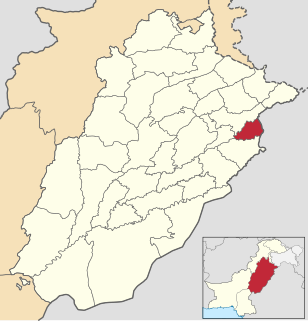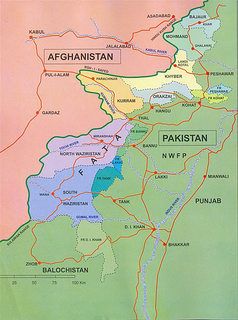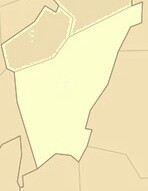
The 2009 Karachi bombing or Ashura attack took place on 28 December 2009 inside a Shi'ite procession commemorating the day of Ashura, at Muhammad Ali Jinnah Road, Karachi. Ashura is the holiest of days for followers of Shia Islam and marks the anniversary of the death of Hussain, grandson of the Islamic prophet Muhammad, who was killed at the battle of Karbala in 680. At least 30 people were initially reported to have been killed, later figures revealed even more deaths while dozens were left injured in the wake of the attack. The attacker marched amongst the procession with tens of thousands of people attending the march. There is some speculation amongst officials as to whether the nature of the blast was that of a suicide attack or a remotely detonated or planted bomb.

The March 2010 Lahore bombings were three separate, but related, bomb attacks in the Pakistani city of Lahore on 8 and 12 March 2010. Lahore, with a population of six million, is Pakistan's second largest city, and the capital of the Punjab province. After several attacks in Lahore in 2009, these were the first major incidents in the city in 2010. The 12 March bombings are the deadliest attacks in Pakistan to date in 2010.

The July 2010 Lahore bombings occurred on 1 July 2010 in Lahore, Punjab, Pakistan. Two suicide bombers blew themselves up at the Sufi shrine, Data Darbar Complex. At least 50 people were killed and 200 others were hurt in the blasts. It was the biggest attack on a Sufi shrine in Pakistan since 2001.

The September 2010 Lahore bombings were a series of three suicide bombings which occurred on 1 September 2010, in Lahore, Pakistan. Thirty-eight were killed and more than 250 were injured when a Shia procession was targeted.
The September 2010 Quetta bombing occurred on 3 September 2010 in Quetta, Pakistan. At least 73 people were killed and 160 injured when a bomb exploded in a Quds Day procession which Shias were carrying out to express solidarity with Palestinians.
These are the list of Terrorist attacks in Pakistan since 2011 of January.
This is a list of terrorist incidents in Pakistan in 2004.

The 2011 Afghanistan Ashura bombings were a pair of bombings in the Afghan capital of Kabul and Mazar-e-Sharif. The Kabul suicide bombing took place at around noon local time, on the day when Muslims commemorate Ashura, an annual holy day throughout the Muslim world particularly by the Shi'a Muslims.

The 2012 Khyber Agency bombing occurred on 10 January 2012, when a bomb exploded near a petrol pump in the town of Jamrud near the Afghan border in Khyber Agency of the Federally Administered Tribal Areas (FATA) of Pakistan. The bombing killed at least 30 people while 78 others were injured.
This is a list of terrorist incidents in Pakistan in 2012. Pakistan has faced numerous attacks by insurgents as a result of the ongoing War in North-West Pakistan by the Pakistani military against militant groups, part of the War on Terror. At the same time, there have also been numerous drone attacks in Pakistan carried out by the United States which exclusively target members of militant groups along the Afghan border regions.
This is a list of terrorist incidents in Pakistan in 2013. Some of the incidents are sectarian in nature and the TTP is responsible for a majority of them.

On 27 March 2016, Easter Sunday, at least 75 people were killed and over 340 injured in a suicide bombing that hit the main entrance of Gulshan-e-Iqbal Park, one of the largest parks in Lahore, Pakistan. The attack targeted Christians who were celebrating Easter. The majority of victims were women and children. Jamaat-ul-Ahrar, a group affiliated with the Pakistani Taliban, claimed responsibility for the attack. The attack led to worldwide condemnation and national mourning throughout Pakistan. Pakistan also launched a widespread counter-terrorism operation in South Punjab, arresting more than 200 people.

On 8 August 2016, terrorists attacked the Government Hospital of Quetta in Pakistan with a suicide bombing and shooting. They killed more than 70 people, mainly lawyers, and injured more than 130 others. The fatalities were mainly advocates (lawyers) who had assembled at the hospital where the body of Advocate Bilal Anwar Kasi, the president of Balochistan Bar Association, was brought after he was shot dead by an unknown gunman. Responsibility for the attack has been claimed by various Islamist groups like Jamaat-ul-Ahrar and the Islamic State. Between 70 and 94 people were killed and over 120 injured. 54 of those killed were lawyers.

On 13 February 2017, a suicide bombing took place on the Mall Road in Lahore, Pakistan, where a group of chemists and pharmacists were holding a protest at Charing Cross in front of the Punjab provincial assembly. According to Punjab Police sources, 18 people were killed, including several police officials, and at least 87 were injured.

On 24 November 2012, the day of Ashura, an explosion took place in Dera Ismail Khan on the crowd of Shiite who were mourning according to their ideology. Ashura is the holiest of days for followers of Shia Islam and marks the anniversary of the martyrdom of Hussain, grandson of the Islamic prophet Muhammad, who was martyred at the battle of Karbala in 680. 8 people were killed while more than 80 people were injured.

The 2009 Dera Ismail Khan suicide bombing was a suicide bombing of a funeral procession in Bargah Kotli Imam, Dera Ismail Khan, on February 20, 2009. The attack killed 32 and injured 65 people.

On May 18, 2010, a bombing took place in Kachi Paind Khan area of Dera Ismail Khan. The bomb was planted on a motorcycle and killed 13 people while injured 14 on its detonation. Deputy superintendent of Kulachi police, Muhammad Iqbal Khan was also among the deceased and was said to be the target of attack.

On 24 July 2017, a suicide bombing took place in a vegetable market in Lahore, Pakistan. 26 people were killed and 58 others were wounded as a result of the explosion. Security officials believe that the attack targeted policemen, as there were 9 killed and 6 wounded. Tehreek-i-Taliban Pakistan claimed responsibility for the attack.

On 5 October 2017, a suicide bomber targeted the shrine of Pir Rakhel Shah situated in Fatehpur, a small town in Gandawah tehsil of Jhal Magsi district in Pakistan's southwestern Balochistan province. At least 20 people, including two policemen, were killed and more than 30 others injured in the suicide attack.

On 13 July 2018, ahead of Pakistan's general election, two bombings took place at election rallies in Bannu and Mastung.










